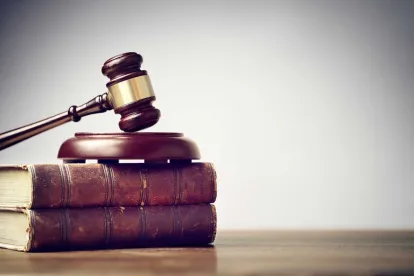Product liability cases often involve complex, multidisciplinary subjects where expert opinion testimony is necessary to explain scientific, technological, or other specialized issues to the jury. Until recently, however, the standard for introducing expert testimony in federal court was not always clear.
Recent Amendments to Rule 702
On June 7, 2022, the Judicial Conference Committee on Rules of Practice and Procedure approved several amendments to Federal Rule of Evidence 702, which governs the admissibility of expert testimony. The amended rule states (new language in italics, prior language struck through):
“A witness who is qualified as an expert by knowledge, skill, experience, training, or education may testify in the form of an opinion or otherwise if the proponent demonstrates to the court that it is more likely than not that:
(a) the expert’s scientific, technical, or other specialized knowledge will help the trier of fact to understand the evidence or to determine a fact in issue;
(b) the testimony is based on sufficient facts or data;
(c) the testimony is the product of reliable principles and methods; and
(d) the expert’s opinion reflects a reliable application of the principles and methods to the facts of the case.
The amendments clarify that the party offering expert testimony bears the burden of proving by a preponderance of the evidence that the expert’s opinions satisfy all of the requirements of Rule 702. If approved by the US Supreme Court and Congress, they will take effect on December 1, 2023.
Historically, several different standards have governed the admissibility of expert testimony. Courts initially only required that the techniques or theories on which the expert relied were “generally accept[ed]” within the scientific community.[1] Even after Rule 702 was enacted in 1975, the general acceptance test continued to apply to the admissibility of expert testimony. Eventually, however, courts in certain jurisdictions interpreted Rule 702 to permit judges to evaluate whether an expert’s techniques were reliably applied to the facts of the case as part of the admissibility determination.[2]
Accordingly, Rule 702 was amended in 2000 to require that expert testimony be based on sufficient facts or data and utilize reliable principles and methods. But, even after these amendments, it still was unclear to what extent the court’s role as gatekeeper allowed it to weigh the reliability of the expert’s opinions before permitting the jury to hear the expert’s testimony.
The 2022 amendments make two important changes to clarify when a trial court may permit an expert to testify at trial.
-
The Proponent of the Testimony Must Demonstrate Its Admissibility by a Preponderance of the Evidence
The amended rule clarifies that the proponent of the expert’s testimony must show that it is more likely than not that the proffered testimony meets the admissibility requirements contained in Rule 702. Prior to the most recent amendments, courts sometimes applied different burdens of proof in performing their gatekeeping role of determining that the expert’s testimony was based on sufficient facts or data and on reliable principles.[3]
-
The Court Must Evaluate the Expert’s Methodology as Part of the Admissibility Analysis
Previously, some courts determined that the factual basis of an expert’s opinion affected the credibility of the testimony — an issue to be evaluated by the jury — rather than the admissibility of the testimony.[4] The proposed amendments to the rule thus clarify that judges must examine the foundation of the expert’s opinion, including the methodology and current practices in the relevant field, as a precursor to assessing the merits of the opinion itself, and then determine if the opinion is within the bounds of what can be concluded by a reliable application of the expert’s methodology to the facts of the case.
The Way Forward
The amendments to Rule 702 require trial courts to place increased scrutiny on proffered expert testimony. Parties should be sure to work carefully with their experts to ensure that their testimony meets the requirements of Rule 702. Some actions that parties should consider in connection with expert testimony include:
-
reviewing the expert’s prior opinions and the factual bases of those opinions;
-
assessing whether the expert’s methodology is supported by publications or other experts in the relevant field;
-
evaluating the foundation of the expert’s testimony, i.e., whether the testimony is supported by sufficient case-specific facts or data; and
-
understanding the breadth of the data on which the expert’s conclusion relies and being prepared to explain to the court through direct examination why that data is exhaustive and sufficient to support the expert’s conclusions.
FOOTNOTES
[1] Frye v. United States, 293 F. 1013 (D.C. Cir. 1923).
[2] Daubert v. Merrell Dow Pharmaceuticals, Inc., 509 U.S. 579, 593 (1993).
[3] E.g., Karlo v. Pittsburgh Glass Works, LLC, 849 F.3d 61, 81 (3d Cir. 2017) (“The test of admissibility is not whether a particular scientific opinion has the best foundation, or even whether the opinion is supported by the best methodology or unassailable research. Instead, the court looks to whether the expert’s testimony is supported by good grounds. The standard for reliability is not that high. It is lower than the merits standard of correctness.”) (internal citations and quotations omitted); Douglas v. Reddy, No. CV 08-1372-MLB, 2010 WL 11561735, at *1 (D. Kan. Jan. 28, 2010) (“[A] party who seeks to exclude an opposing expert by means of a Daubert hearing bears a practical burden to demonstrate that the expert’s opinion may not pass through the gate of a Daubert hearing.”)
[4] E.g., Larson v. Kempker 414 F.3d 936, 941 (8th Cir. 2005) (“As a general rule, the factual basis of an expert opinion goes to the credibility of the testimony, not the admissibility, and it is up to the opposing party to examine the factual basis for the opinion in cross-examination.”) (internal citations omitted).




 />i
/>i
